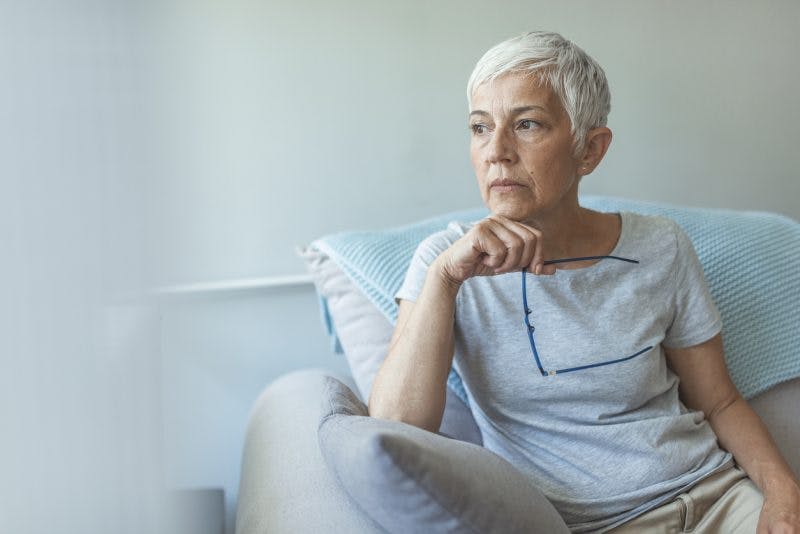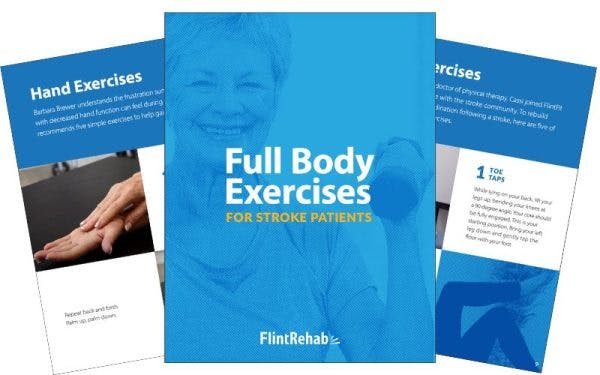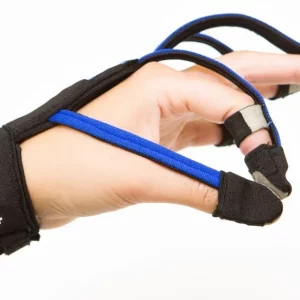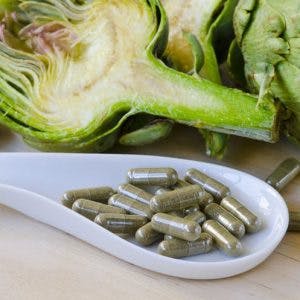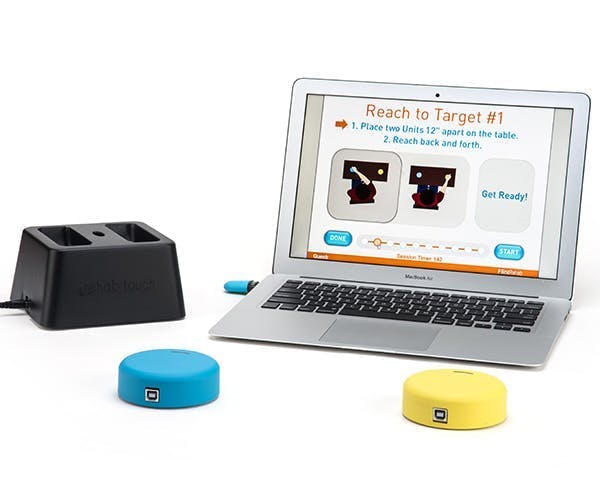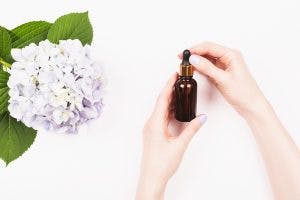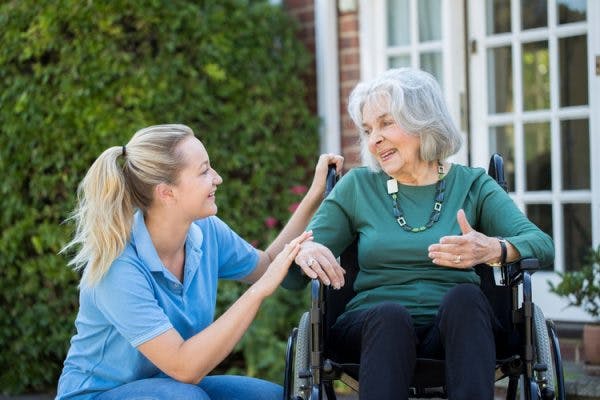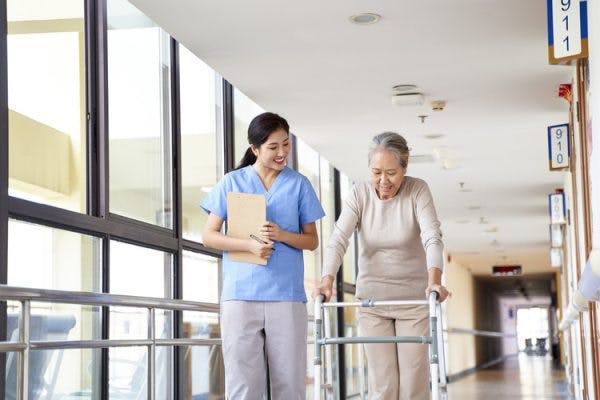Anxiety after stroke is common among survivors and can have a major impact on daily life. Stroke can cause many different physical and emotional secondary effects, often altering a survivor’s independence and leading to other health complications. For this reason, anxiety is one of the most frequent emotional challenges after stroke.
Coping with anxiety after stroke can be difficult for both survivors and caregivers. To help you navigate this condition, this article will discuss the different symptoms of anxiety a stroke survivor may experience. Then, we will walk you through the treatment options available to help you manage your anxiety symptoms. These options will include both medications and natural alternatives to help you make the best decisions for your own unique needs.
Understanding Anxiety After Stroke
Anxiety can be described in many ways but is often characterized by fear and panic in response to certain daily activities or situations. This can be both a physical and a psychological response, sometimes seeming out of proportion when compared to the situation itself. Anxiety is also sometimes described as a feeling of intense worry or unease, restlessness, or irritability.
In addition to the intense psychological effects of anxiety, this condition can lead to various physiological effects. This includes sweating, shaking or trembling, a tingling sensation in the limbs, increased heart rate, and even chest pain. These symptoms can feel overwhelming and debilitating if left untreated.
There are many reasons why a survivor may experience anxiety after stroke. For example, survivors frequently experience anxiety related to their health. A recent study has found that 25% of stroke survivors experience moderate to severe anxiety. This anxiety often occurs anywhere between two to eight weeks after the stroke, although it can take place at any time during the recovery journey.
Some of the most common worries that stroke survivors report include:
- Having a second stroke or TIA
- Being unable to communicate during an emergency
- Feeling embarrassed in social situations
- Being unable to drive
- Never feeling better or improving
- Traveling alone
Most of these fears are understandable and are even normal and healthy. However, if anxiety persists and becomes overwhelming, you may have developed an anxiety disorder. This can have a major impact on health, independence, and relationships after stroke. For this reason, it is important to identify and treat your anxiety, which we will discuss next.
Identifying Anxiety Disorders After Stroke
Anxiety disorders cause more than just a constant feeling of worry. As we discussed earlier, anxiety can include many other physical and psychological symptoms. For this reason, it may be difficult for survivors to differentiate between temporary feelings of worry about a situation and true anxiety.
What distinguishes anxiety disorders from normal worry is intensity and persistence. Everybody feels nervous at times, but for someone with an anxiety disorder after stroke, this nervousness will feel overwhelming and will happen often. Unfortunately, anxiety can even stop survivors from participating in the things they love.
Other signs that you might have an anxiety disorder include:
- Feeling irritable
- Difficulty concentrating
- Constant fatigue and sleep problems
- Persistent thoughts about the things that worry you
- Continual feelings of impending danger
- Physical sensations such as restlessness and rapid heart rate
Most anxiety disorders after stroke are caused by psychological and biological changes in the brain. Additionally, there are many different types of anxiety that can present uniquely. Some types of anxiety may require more complex treatment approaches.
It is important to talk with your doctor if you are experiencing these persistent symptoms. They will help you get connected with the appropriate care to manage your anxiety and improve your mental and emotional health. Additionally, they can help if you are experiencing feelings of depression after stroke, as this is common among survivors.
Interventions for Anxiety After Stroke
The first step you can take to cope with anxiety after stroke is to seek out information. Talking to a doctor or psychologist about your feelings can help you clear away uncertainty and give you an increased sense of control. Additionally, seeking support from your friends, family, and groups in your community can help you feel less alone as you navigate anxiety after stroke.
Besides seeking support from those around you, there are more specific methods for managing anxiety. These treatment and coping methods, which involve medication and non-pharmacological treatments, include the following:
1. Mindfulness
One of the best ways to cope with anxiety after stroke is to practice mindfulness techniques. Mindfulness simply means focusing on the present moment. This can help you stop dwelling on what the future may hold, which is often the source of anxiety. In fact, a recent study showed that practicing mindfulness was as effective as medication for the treatment of anxiety.
To practice mindfulness, it helps to have a point of focus that pulls your attention to your body. For most people, this point of focus is their breath. When you focus on your breath, it’s much harder for thoughts and worries to sneak in.
How to Begin:
Start by closing your eyes and inhaling slowly. Imagine the air entering through your nose, filling your lungs, and expanding your abdomen. Then, as you exhale, picture the air flowing out the same way. Once you’ve done this a few times, try expanding your awareness to take note of the sensations you feel. What sounds do you hear? How do your feet feel on the ground? What emotions do you feel?
During your time of mindfulness, you can also practice progressive muscle relaxation to increase awareness of your body. This can reduce muscle tension, which often builds up due to anxiety. Progressive muscle relaxation involves the gradual tensing of muscle groups, followed by relaxing them.
Starting at the feet, curl the toes and hold for a few seconds, then relax. Move to the ankles, bending them upward and holding, then again relaxing. Continue to move up the body until you reach your head. When you are finished, your muscles should feel more relaxed, and you will have spent time building awareness of each area of your body.
Try to keep yourself present like this for at least five minutes each day. If you have trouble practicing mindfulness independently, there are various apps and videos online that can help you remain mindful of your breath and guide you through progressive muscle relaxation. You should notice your anxiety decreasing the more you practice.
2. Cognitive-Behavioral Therapy
If practicing mindfulness is difficult, cognitive-behavioral therapy may help you cope with anxiety. Cognitive-behavioral therapy (CBT) is the most scientifically verified treatment for anxiety disorders. In fact, there are over 1,000 studies on 10,000 patients, all demonstrating its effectiveness. CBT has been successively used on a wide variety of disorders, including stroke.
Cognitive-behavioral therapy is based on three core principles:
- Beliefs create feelings
- Feelings dictate behavior
- Behavior reinforces beliefs
To get to the root of anxiety, most CBT treatments focus on uncovering unhealthy thinking patterns. For example, if you have anxiety after stroke, a psychologist can help you identify the thoughts that are fueling your anxiety. Then, they will teach you helpful techniques to stop these thoughts from overwhelming you.
Your psychologist can also show you effective ways to distract yourself from anxiety. These techniques can help you to reduce your anxiety before it becomes severe. Every survivor is different, so talk with your therapist and try different techniques until you find the combination that is most effective for you. Some potential coping strategies may include:
- Exercise
- Spending time outdoors
- Journaling
- Practicing yoga
- Listening to music
- Taking small breaks during the day
3. Medication
Sometimes anxiety after stroke is caused by tissue damage to the parts of the brain that control your emotions. Additionally, some survivors may experience anxiety that is severe and negatively affecting their quality of life. In these cases, medications can be a beneficial treatment to relieve anxiety symptoms. Some of the most common medications prescribed for post-stroke anxiety include:
- Antidepressants, specifically SSRIs
- Benzodiazepines, which treat anxiety directly
- Antihistamines, such as hydroxyzine
These medicines are usually used only on a short-term basis. For example, they can help get a person’s anxiety under control if it is severe. However, many of these medications are not suitable for extended use. With some, effectiveness wears off fairly quickly. Additionally, long-term use of some anxiety medications can cause dangerous withdrawal symptoms that can foster addiction. In some cases, long-term use may even impair recovery.
For chronic anxiety, some doctors prefer to prescribe antidepressants such as venlafaxine. This SSRI has fewer negative effects when used long-term. Since anxiety medications are so powerful, they should only be used when natural alternatives are not effective. Never start, alter the dosage, or stop any anxiety medication without consulting your doctor first.
4. Diet Changes
Your diet can have a large impact on your physical and mental health, and certain foods can even exacerbate anxiety. For example, a recent study linked the consumption of ultra-processed foods to a greater incidence of anxiety and depression. Therefore, changing your diet may help reduce or even eliminate anxiety after stroke.
In addition to highly processed foods, some common anxiety-inducing foods can include:
- Food and drinks high in sugar
- Fried foods
- Caffeine
- Alcohol
- Refined carbohydrates
Not all of these foods will necessarily cause you anxiety, but they can make symptoms more severe in some cases. Additionally, you may have food sensitivities to only a few of these things. One way to determine which foods are affecting you is to try an elimination diet. An elimination diet involves temporarily removing all possible trigger foods from your diet. Then, once you have eliminated all these foods for a few weeks, you can add one food back at a time.
If you notice an improvement in your anxiety symptoms, this may be a clue that certain foods make your symptoms worse. When you begin adding foods back into your diet, pay attention to how you feel after each addition. If food sensitivities are something you continue to be concerned about, speaking with an allergist or nutritionist can provide you with more information.
As you pursue recovery, focus on building your meals from whole foods. Prioritizing lean protein, fresh vegetables and fruits, and whole grains is a great way to start. Check out our list of the best foods for stroke recovery to get ideas for foods that can help decrease anxiety. Additionally, a healthy diet focusing on these food groups can boost neuroplasticity, your brain’s ability to heal and repair lost connections.
5. Exercise
Exercise after stroke is crucial to help you regain physical function and reverse the secondary effects of stroke, such as hemiplegia or hemiparesis. High repetition or massed practice of your rehab exercises will allow you to regain leg strength, increase hand function, and even regain the ability to walk after stroke.
As we mentioned briefly in a previous section, exercise can also generate mental health benefits. Exercise has been shown by research to reduce anxiety and stress-related disorders. Additionally, exercise can improve your cardiovascular health, help you manage stress, and even reduce your risk of a second stroke.
Work closely with your physical and occupational therapists to create an exercise program that meets your unique needs. They can also recommend ways to include cardio in your daily routine to improve your cardiovascular health. While medication may still be necessary to control anxiety after stroke for some survivors, exercise is a great way to boost your mental health.
Finding Relief from Anxiety After Stroke
Anxiety is a common emotional effect of stroke. This is unsurprising due to the major life changes that affect stroke survivors and their caregivers. However, if these anxious feelings persist for weeks and affect your activities, you may have developed an anxiety disorder. Anxiety can negatively affect many aspects of daily life, which is why it is important to seek treatment for this condition.
The best management for anxiety disorders often involves a combination of multiple treatments. For example, this might include mindfulness, cognitive therapy, diet changes, and exercise. Additionally, medication may be necessary to treat severe cases of anxiety. Talk with your doctor about your concerns and follow the advice of your therapy team to see the best treatment results.
We hope this article has helped explain anxiety after stroke and what symptoms survivors commonly experience. Additionally, we hope you feel inspired to seek treatment for your anxiety and can be motivated to continue pursuing recovery. While anxiety after stroke may be common, comprehensive treatment will allow you to get back on the road to rehabilitation.

